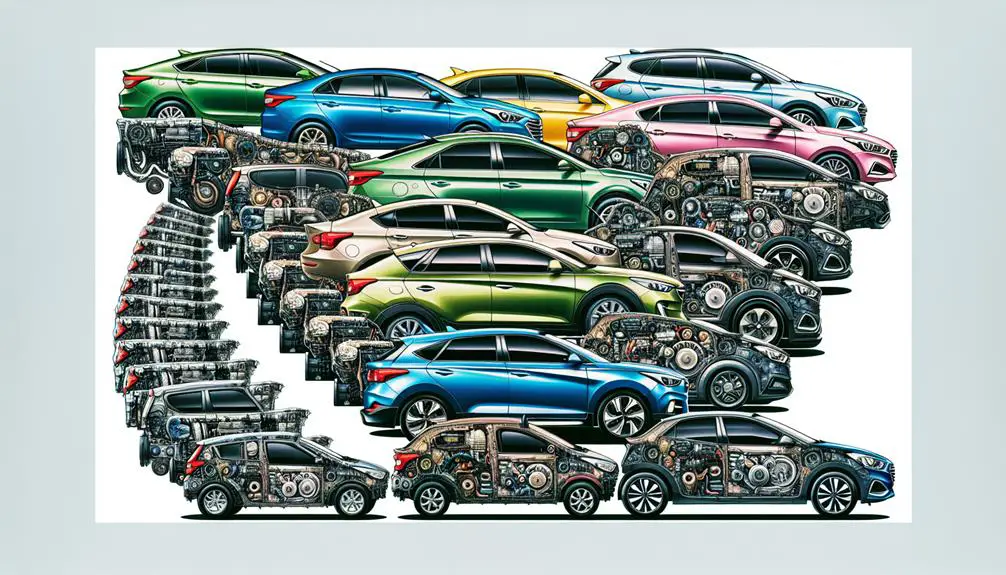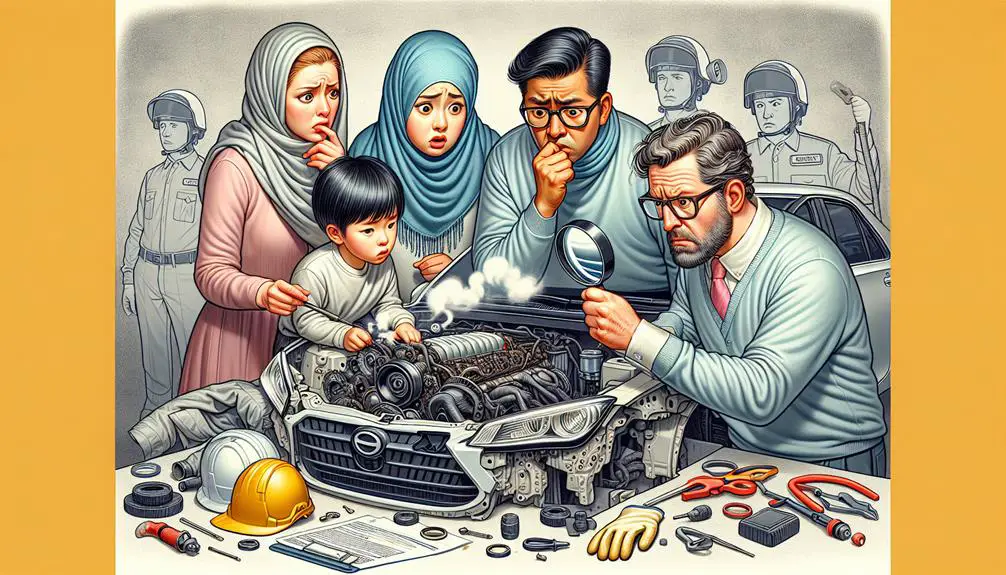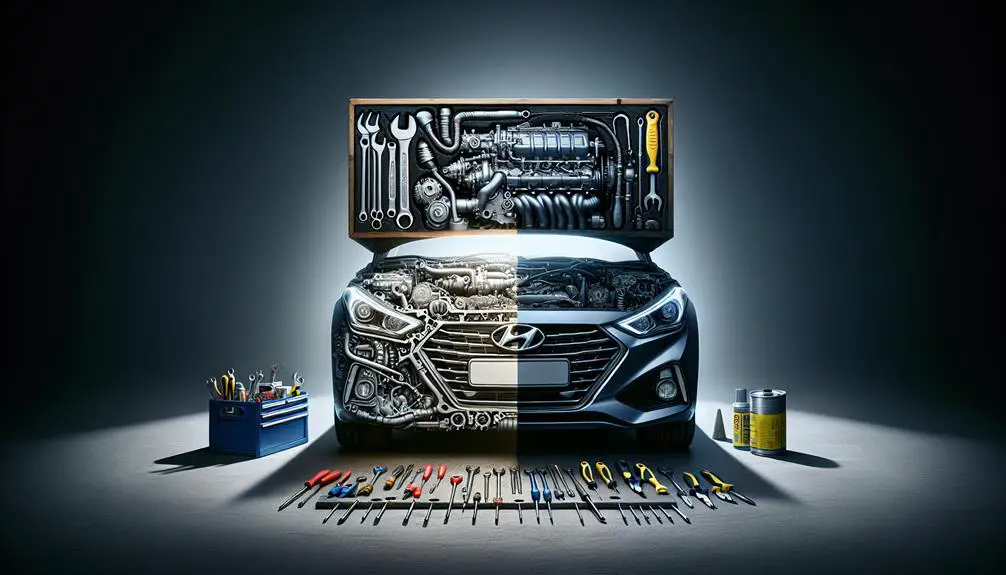Hyundai engines have faced significant issues due to recurring failures and consumer safety concerns.
This has led to economic and legal challenges for the company.
Historical Engine Failures

Why have Hyundai's engines historically faced numerous failures? You might find the roots of these issues in a combination of design ambitions and the rigorous demands of modern driving. Hyundai, in its quest for innovation and market expansion, pushed the boundaries of engine technology. However, this ambition sometimes outpaced the durability and reliability of their engines. You've likely heard stories or even experienced the frustration of sudden engine shutdowns or loss of power while driving. These aren't mere inconveniences; they pose serious safety risks.
You shouldn't overlook the role of thermal management in engine performance. Hyundai's engines, especially in their earlier models, struggled with maintaining ideal operating temperatures under high loads or in extreme weather conditions. This thermal stress can lead to premature wear and tear of engine components, ultimately resulting in catastrophic failures. It's not just about the discomfort of a stalled car; it's about the potential danger it brings to you and others on the road.
Moreover, the integration of advanced technologies for fuel efficiency and emission reduction has introduced new challenges. These technologies are complex and require precise calibration and maintenance. Even minor lapses in maintenance can worsen existing vulnerabilities in Hyundai's engines, leading to failures that could have been preventable. You're left wondering whether the pursuit of technological advancement came at the cost of reliability.
As a driver or potential buyer, these historical engine failures are a vital factor to take into account. They highlight the importance of not just innovation, but also the reliability and safety of what's under the hood.
Recurrent Manufacturing Flaws
Addressing Hyundai's recurrent manufacturing flaws sheds light on the persistent challenges that have compromised engine performance and reliability over the years. You've likely heard stories or maybe even experienced firsthand the frustration of owning a vehicle that doesn't meet expectations due to these underlying issues. It's not just about the inconvenience; it's about the trust that's been shaken between you and a brand you chose to rely on.
One of the most critical flaws you'll find in Hyundai engines is the issue with metal debris left over from the manufacturing process. This oversight can lead to premature engine wear, and in some cases, complete engine failure. Imagine you're driving, confident in your car's ability to get you from point A to B, only to find yourself stranded due to a preventable manufacturing mistake. It's not just disappointing; it's unacceptable.
Then there's the problem with the engine's design that leads to excessive oil consumption. You might find yourself topping off the oil more frequently than you ever thought necessary, an issue that not only hits your wallet but raises questions about the longevity of your engine. It's like a leaky faucet that keeps draining, no matter how much you try to tighten it.
First, the cooling system has been a thorn in the side for many Hyundai owners. An engine that can't maintain its cool under normal operating conditions is more than a nuisance; it's a ticking time bomb for overheating and potential engine damage. You're left wondering if your car will make it through the summer or if you'll be left dealing with the fallout of yet another manufacturing flaw.
Consumer Safety Concerns

The persistent engine problems in Hyundai vehicles have raised significant safety concerns for consumers. You may have heard stories or even experienced sudden engine failure while driving, which isn't just a minor inconvenience; it's a serious safety risk. Imagine you're on the highway, surrounded by fast-moving traffic, and your car suddenly loses power. You're put in an incredibly dangerous situation, not only for yourself but for other drivers around you.
These issues aren't isolated incidents. They're part of a troubling pattern that affects a wide range of Hyundai models. You've likely bought your car thinking it would be reliable, safe, and a good investment. However, these engine problems undermine those expectations, leaving you with a vehicle that could potentially put you and your loved ones in danger.
It's not just about the risk of accidents. There's the stress and anxiety of not knowing when your car might fail. Every time you start your engine, there's a lingering worry: will today be the day it breaks down? This constant concern for your safety isn't something you should have to deal with, especially from a brand that prides itself on quality and reliability.
Dealing with these engine issues often means unexpected trips to the mechanic, towing fees, and potentially being without a vehicle for days. You're forced to rearrange your life around a problem you didn't cause, which is frustrating and unfair. The safety of your vehicle shouldn't be a gamble. You deserve peace of mind on the road, something that these persistent engine problems have unfortunately taken away.
Economic and Legal Repercussions
Beyond the safety concerns, you'll face significant economic and legal repercussions because of Hyundai's engine problems. These issues not only affect your daily commute but have broader implications that can hit your wallet hard and entangle you in legal complexities. Understanding these repercussions is important, especially if you're currently driving a Hyundai or considering purchasing one.
Here's a breakdown of the economic and legal repercussions you might encounter:
- Decreased Resale Value: Your Hyundai's resale value might plummet because of widespread awareness of the engine issues. Potential buyers are likely to be cautious, making it harder for you to get a good deal when selling or trading in your car.
- Increased Insurance Premiums: Insurance companies might view Hyundai models with known engine problems as higher risk, which could lead to increased premiums for you, regardless of your driving record being clean.
- Repair and Replacement Costs: Facing engine failure means spending money on repairs or a replacement. These costs can be high, especially if your vehicle is out of warranty.
- Legal Fees: If you find yourself caught up in a lawsuit or a class-action suit against Hyundai, you could be looking at substantial legal fees, regardless of the lawsuit's outcome.
- Loan Payments on a Nonfunctional Car: If your Hyundai is financed and it breaks down because of engine failure, you're still responsible for loan payments, even though the car might be sitting idle in your driveway.
Facing these economic and legal repercussions head-on can be challenging. Yet, being informed is the initial step in navigating these challenges effectively.
Efforts Towards Resolution

Recognizing these challenges, Hyundai has initiated several measures to resolve the engine problems and lessen the impact on owners. You've probably heard about the extensive recalls, a bold move aimed at fixing the underlying issues in millions of vehicles. This isn't just a guarantee solution; it's a all-encompassing approach to guarantee your safety and the longevity of your vehicle. Hyundai's not stopping there. They're additionally extending engine warranties, a clear sign they're standing behind their products and committed to rectifying the situation. Imagine having a longer warranty period, giving you peace of mind that you're covered should anything go awry.
Moreover, Hyundai's ramped up its customer service efforts. You now have access to more transparent communication channels and support services. This means if you're facing any issues or have concerns, getting help is easier and more straightforward than ever. It's all part of Hyundai's pledge to rebuild trust and reassure you, the owner, that you're in good hands.
Moreover, Hyundai is investing heavily in research and development to improve engine technology and prevent similar issues in the future. This isn't just about fixing a problem; it's about revolutionizing the way cars are made to ensure they're safer, more reliable, and more enjoyable to drive.
Conclusion
You've seen Hyundai's path through engine troubles, from historical failures and manufacturing flaws to the safety risks and economic fallout. Although these challenges, Hyundai's commitment to resolving these issues is evident.
They're making strides in addressing consumer safety and rectifying past mistakes. It's a bumpy road, but with continued efforts towards improvement, there's hope for Hyundai to turn these challenges into a proof of resilience and dedication to quality and customer satisfaction.
Keep watching this space.